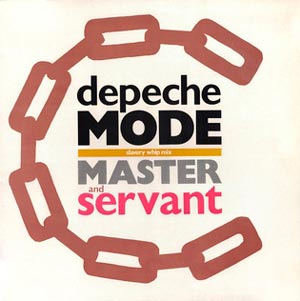Released in August 1984 as the second single from their fourth album, “Some Great Reward,” “Master and Servant” by Depeche Mode is one of the band’s most provocative and thematically daring tracks. With its industrial beats, sexual metaphors, and critique of societal power dynamics, the song cemented Depeche Mode’s reputation as synthpop pioneers unafraid to challenge norms.

“Master and Servant” was written by Martin L. Gore, the band’s chief songwriter, and produced by Daniel Miller, Gareth Jones and the band. At this point in their evolution, Depeche Mode was moving beyond the catchy pop of their early work into darker, more experimental territory. Following the success of “People Are People,” the band doubled down on themes of power imbalance, submission, and social structures, using metaphor and stark electronic arrangements to drive their messages home.
The song stirred controversy even before its release. It narrowly escaped a BBC Radio ban because of its overt references to BDSM and sexual dominance, although the band insisted the lyrics also metaphorically addressed class, politics, and control.
Musically, “Master and Servant” is a mix of industrial, synthpop, and dance. It features pounding electronic drums, metallic percussive sounds, and distorted synth stabs that evoke a mechanized, dystopian world. These harsh textures are balanced by a groovy, club-ready rhythm that gives the track a strangely seductive energy. Dave Gahan’s vocal delivery is commanding and intense, fitting the song’s provocative tone. Behind him, the backing vocals and effects (including sampled whip cracks) contribute to the track’s sense of stylized domination. This fusion of dark thematic content with dancefloor appeal became a signature Depeche Mode formula and a major influence on future industrial and electronic artists.

At its core, “Master and Servant” explores the roles people play in relationships—both romantic and societal. On the surface, it references BDSM dynamics. But beneath the sexual metaphor, the song critiques how people are often dominated and manipulated by systems of authority, be it in work, politics, or social class. The “master” can be a literal partner, or a boss, a politician, a system.
Despite (or because of) its controversy, “Master and Servant” became a hit, reaching No. 1 on the UK Indie Chart, No. 9 in the UK Singles Chart and charting across Europe, including No. 2 in West Germany. In the U.S., it made waves on dance charts but received limited radio play due to its explicit overtones.
“Master and Servant” by Depeche Mode is a landmark track in 1980s electronic music—a provocative blend of synthpop and social commentary. With its edgy production, metaphor-laden lyrics, and fearless approach to taboo themes, the song pushed boundaries and deepened the genre’s artistic potential. Nearly four decades later, its exploration of power, control, and desire still feels relevant—and undeniably bold.
